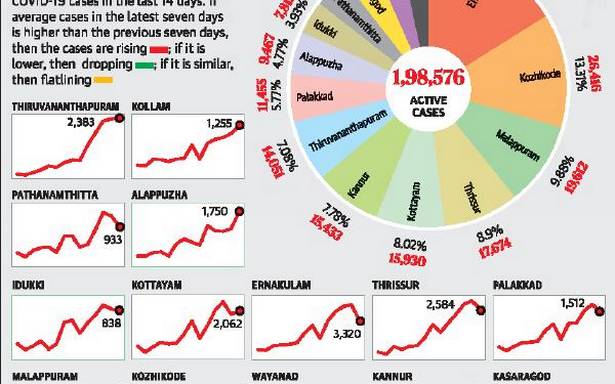Avoid unnecessary admissions, improve home monitoring facilities: experts
The steady and steep rise of new COVID cases in the State is increasingly pointing to a situation wherein there is a high likelihood that the cases may exceed health system’s surge capacity in another two weeks.
Authorities are well aware that even when the current surge capacity (public and private together) is quite high, a scramble for hospital beds and ICUs is a distinct possibility, given the pace of disease transmission.
Even when the private sector has been asked to increase its capacity and set aside 25% of the beds exclusively for COVID-19 care, the current situation is such that hospital beds and ICU beds will have to be reserved for only those patients with serious disease. Preventing unnecessary hospital admissions is the first step in managing surge capacity, critical care experts say.
They call for the government to ensure that the home-care manual for patients is improved, with better monitoring facilities in place, so that patients with mild/asymptomatic disease need not seek admission.
Need for hospital care
“Streamlining hospital admissions is important. There can be no on-request admissions. During the first wave, we allowed hospital admissions for people who did not have facilities at home or just because the patients felt more confident remaining in hospital care. We cannot afford to do that any more,” says A.V. Jayakrishnan, chairman of the IMA Hospital Board of India.
Doctors point out that nearly 95% of the patients can be managed at home with oral medicines, fluids, rest and regular monitoring of oxygen saturation levels.
Blame it on panic
However, it is panic that drives many to seek admission in hospitals. COVID-19 patients with diabetes or those on cardiac medications are quite anxious about remaining home.
“In a dire situation, we should be able to help patients remain calm at home. We can train volunteers on following up patients on home care. The Indian Medical Association (IMA) is in the process of drawing up a plan of action for home care of COVID patients,” P. Gopikumar, its State secretary, says.
“Apart from checking oxygenation status, it is critical that the COVID-19 patient in home care knows exactly what to watch out for, what to do next, and most importantly, which hospital to go to. Ideally, he should be in constant touch with a doctor, at least online,” says Rajeev Jayadevan, a Kochi-based clinician
The State will soon be taking a relook at its COVID discharge policy, wherein patients are discharged only after they test negative.
The expert committee on COVID has been pointing out for a long time that this is unnecessary.
Source: Read Full Article

